
SEASON TWO
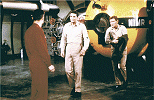



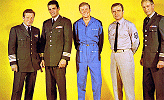
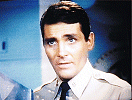
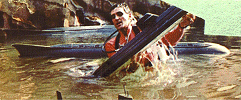
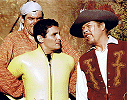
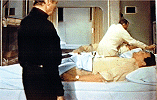
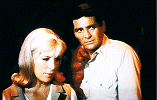
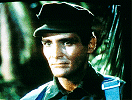
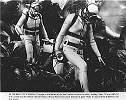



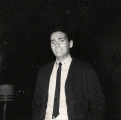



David answers
questions from the audience at Dixie Trek 1993.
DT: Did you do
your own stunt work on "Voyage?"
DH: "In Voyage I did a lot of my stunt work, particularly in the first year. I did all the underwater stuff, and all of that in the. . . when I was inside the whale and all that stuff I had to do. And then towards the end, like in the third or fourth year, they used a lot of the stock footage. Stuff I had done before, they used again, or they would use a double. Yes?"
DT: "What was it like working with Richard Basehart?"
DH: "What it was like was fantastic! I was a very lucky actor to be working with him. You know, originally I had turned down Voyage I remember Irwin Allen, I had done a film for him called The Lost World which I hated, I just hated that film, and hated working in it and I was very depressed doing it, so then when Irwin called me about a film called Voyage to the Bottom of the Sea, I thought no way do I want to do that. But at the same time, I didn't want to go on suspension. I said to him, I told Irwin I just don't want to do it now, I think I'm doing another film. Well, luckily I wasn't put on suspension and thank God I got out of doing the film. So, then a year or two later the movie came the series and I ran like crazy. I didn't want to touch it because I knew the kind of thing it was going to be and I wanted to do something more like "The Man From UNCLE". You remember that series?" (Applause) "Something like that. What are you applauding for?" (Laughter)
DT: " We liked it."
DH: "So did I."
DT: "Wasn't your main complaint that your character was one dimensional?"
DH: " Yes, yes, exactly. And all the emphasis was that the characters were one dimensional and all the emphasis was on photo effects, and of course in the fourth year, which drove me crazy, every monster in the world -- fishman, frogman, rockman, God, I don't know, it just drove me nuts. But I'm getting off the subject. We started talking about Richard Basehart. That was your first question. He was a wonderful man. He taught me an awful lot, because I don't think I was as good an actor at that first year as I was when the series ended. I learned a lot from him and I'm grateful, and I love you Richard!"
(Applause as David looked up to heaven.)
DT: "I
was just wondering. I've seen a TV Guide photograph of you from 1965 that
showed you with the Seaview models. Could you kind of set the scene on how
they arranged that?"
DH: "No, they set the scenes. They just said you stand here and you do this and you do that, and that's what we did. Are you talking about the cover?"
DT: "Yeah."
DH: "That was with Richard Basehart, wasn't it?"
DT: "No, this
was an inner article where they were just discussing the miniatures and
the series and what they had done. You are coming out of the water holding
the Seaview up, and I wondered how they kind of prompted all that."
DH: "I just think it was an idea they had and they said, Why don't we try
this? They must have had, you know, about 150 pictures, and they thought
that looked kind of nice so they choose that one. Yes sir?"
DT: "You're a diver, right? Do you dive?"
DH: "Yes sir, I do, I used to do a lot of it just before I did Voyage. I went up to the coast of Catalina in Los Angeles, and I'd do a lot of that. I learned through a friend of mine, Patrick Cunningham, so it was really really very interesting. I liked it a lot. I haven't done it lately, though."
DT: "Where's the most exciting place to go?"
DH: "Catalina Island."
(Laughter)
DH: "Yes?"
DT: Specifically on Voyage, one of the scenes that I enjoyed the most and it's there in almost every episode is when, say . . . "
DH: "The rock and roll."
DT: "Yeah. How did that work?"
DH: "The rock and roll. Well, I'll tell you what happened, how we did that. It was very simple, and no one can believe it. There would be one of the men on the crew who had a pail. Okay? A little old bucket with a hammer in the other hand. When he hit that pail, we would go flying to the left (Laughter) . . . and the camera would go jiggling to the right (More laughter) . . . and then when he hit the pail again we would go flying to the right (Laughter) . . . and the camera would go jiggling to the left. Back and forth. Bam, bam. Of course, you never heard the sound of the pail in the actual film, because they put the sound effects in and what not, but that's how we did it. And that was Irwin's idea and it worked very well. I mean, you really think that the place is going to fall apart. It was very exciting. Yes sir?"
David demonstrated the rock n roll as he told the above story. "We would go flying to the left . ." David staggered left. "And then when he'd hit the pail again and we would go flying to the right..." David staggered stage right. The audience went bananas, cheering and clapping.
DT: "You were talking while ago that you had talked to a guy about he'd
put together a script for a Voyage to the Bottom of the Sea movie. Would
you do it if it came about?"
DH: "Sure." (Laughter) "I'd be happy to do it if I liked the script and I liked the way Captain Crane was written. The thing is, I haven't read the script yet, but I've seen the pictures and all that stuff, but I don't know too much about the story. But I'd be very happy to do another one. I thought they were going to make one of, do a movie for television, but that never transpired. I think that if Richard were still alive, they probably would have done something. And I think the very fact that he died, and that he was such a strong power behind Voyage, I think that's probably one of the reasons they let it die. That's what I think. Yes sir?"
DT: "Why do you think Barbara Eden didn't make the switch from the movie Seaview to the TV Seaview?"
DH: "Barbara Eden? Ohhhh... I don't know. I'll tell you why, I do know. Because I didn't think that Irwin wanted women on the Seaview in the TV series. And I'll bet you don't know why, do you?"
DT: "No sir."
DH: "You have no idea, do you? 'Cause I do." (Laughter)
DT: "Well, then tell us."
DH: "Exactly, because he was very tight with the money. And you know, getting David Hedison ready takes five minutes. You just slap something under his eyes to take the dark circles away, and then that's it. I'm finished. With a girl though, the hair, getting it right, and the curlers, the dryer, she's half an hour late, her make-up is wrong, the costume doesn't fit right. It takes time, and time is money. And he said he didn't want to bother with any of that with the women. And that's why we didn't have too many women. Even though one year I thought they were, what was it...Tiffany [Loveland] was the name of the girl they were going to have. And that never transpired. Which saddened me."
(Laughter)
DH: Such is life. Yes?"
DT: "Can you tell us a little about what it was like to work with Bob Dowdell?"
DH: "Bob Dowdell. Bob was a lot of fun. I really enjoyed working with him. We were neighbors, as a matter of fact. He lived right across the street from me, and I think it's all right to say I got him the job, Yeah, I did. Really. I got Captain Crane and he lived across the street and I said you can play Chip Morton, and I went to Irwin and I said I've got the fellow to play Chip Morton and he didn't give me any problems. Bob had done Stoney Burke before that, with Jack Lord, and Irwin looked at a couple pieces of film and that was it. He got the job and we became good friends. Except I haven't seen him in about ten years. But, I'm sure he's fine. Any more questions? Yes?"
DT: "Mr. Hedison, I think my favorite thing, and probably a lot of the people in this room, about the Irwin Allen productions were the lavish sets. On Voyage, when you're actually on the set, were they as neat as they appeared on TV?"
DH: "Oh yes, very exciting sets. They look better on television, of course, because they would go from the real Seaview, and then we'd go to the miniature underwater. And as you were watching the show, to you it's all one thing. No, it was very exciting. We had some very good sets. I'm sure not as mammoth as Mr. Speilberg's is going to be, [for SeaQuest] but for the time they were really good. We had some stuff, some really good stuff."
DT: "Mr. Hedison, a lot of the fan magazines feel that the reason Irwin Allen's shows didn't last longer than they did is because they became a monster of the week show."
DH: "Exactly!"
DT: "Do you agree with that?"
DH: "I most certainly do. That's why I say I was so disappointed, I think it was the fourth year, where they had a lot of that. The Fossil Man was one, and another one called The Manfish."
DT: "They did a lot of that on Lost in Space."
DH: "Well, I never saw Lost in Space so I don't know what they were doing on that show. I had enough of my own, I couldn't bear to watch anything else." (Laughter) "I needed a little variety in my life."
DT: "Did he
do that simply for effect?"
DH: "I think that's what he thought the audiences wanted. I really do. And
I knew that he knew he had the young audience, kids, but I don't think he
realized that he had so many adults, as well. And I have had people talk
to me and tell me they made a family thing out of Voyage. They would go
home and they would sit together and have dinner as a family, and then
they'd watch Voyage to the Bottom of the Sea. So, older people liked it as
much as the young kids. It was amazing that he couldn't see that. And if
he'd just made it a little bit more adult at times, I think it would have
gone on a little longer. I remember once this agent friend of mine had a
big journalist, from one of the big magazines, and he had to take the
journalist to go see the Beatles, who were very hot at this particular
time. We're talking '65, and they were very very hot. So, he went to the
Beatles, where they were staying, and those Beatles would not come out of
their room until Voyage was finished. (Laughter.) No way, I don't care who
this guy is, forget it." (Applause) I don't know why, maybe I'm insecure,
but I thought they were looking down on the show, but they weren't. They
were watching it."
DT: "I personally feel that the first season of Voyage, and also the first season of Lost in Space, were the best."
DH: "Yes, a lot of people say that. You're right. Yes?"
DT: "In relation to this gentlemen's question a moment ago about the sets, the first season appeared, the underwater scenes, the first season appeared to be shot in a lake primarily by the plant life you could see in the set. Would you elaborate a little on that? And then, when it went to color, the underwater sets became more elaborate and everything. Were they shot in a tank?"
DH: "I'll tell you, the first year we shot off the coast of Catalina and they did a lot of that there. When they went to color, they went into a huge tank on Stage B, I remember it well. It was a huge tank so they could dress the tank so well with different colors and all that sort of thing. And that's what they did. Yes sir, back there?"
DT: "I have sort of a trivia question. What movie was the Voyage computer set used in?
"The Desk Set with Spencer Tracy." (Yelled from the audience)
DH: "The Desk Set. And you know something, I never knew that until I saw The Desk Set about two years ago and I went Ohhhhhh, nice set!" (Laughter and scattered applause)
DT: "Tell them who the actors are."
DH: "Oh, the actors in The Desk Set. Katherine Hepburn and Spencer Tracy. And the computer. I don't remember what year that was, but it was after . . ."
DT: " '57."
DH: "Yeah, can you believe it? Those sneaks. Do you have any more questions?"
DT: "You don't suppose Voyage to the Bottom of the Sea inspired the Beatles to write and star in Yellow Submarine?" (Laughter)
DH: "It
could've. I never thought of that. You know, you're absolutely right. I've
known they loved that show. They loved that show, and, you know, it's
amazing it's played in a lot of countries, as Gary [Conway] is always
boasting that his show is in so many countries." (Laughter) "But it played
in London and they loved that show in London. They played it every week
and they did show the whole 110 hours. People are going crazy. I was
getting these letters from people who've seen it as children and now are
showing it to their children, and they've been telling me how much more
they appreciated it today than they did 20 or 30 years ago when it was
first on. It's amazing. Yes ma'am?"
A man starts to speak.
DH: "You're not a ma'am!" (Laughter)
DT: "Looking back at your old press releases and that type of stuff, did you ever get tired of reading how active you were with the ladies? I mean, you were dating everybody, according to the press."
DH: "I hope my wife's not here." (Laughter) "No, I was dating a lot, I was sowing my oats. I was having a good time. I was working, I was dating, I was, I don't know."
DT: "Did you ever get tired of...?"
DH: "Did I ever get tired of dating? No. Any more questions? Oh, yes, you that thought you were a ma'am." (Laughter)
DT: "You said while ago that if you knew that it was on, you'd watch it with your daughters. Well, it's on every day at 2:00."
DH: "On the Sci-Fi Channel, but we don't have it in New York and we don't have it in Los Angeles either." (Audience makes disbelieving noises) "No, we don't have it. Because, you know the big cities like New York for instance, we have so many things on the. . . Maybe there's no room, I don't know. But we've got a lot of choices in New York on the cable. The Nostalgia Channel, but no Sci-Fi. But I think eventually they'll bring it in, I'm sure. 'Cause I know a friend of mine has a, what do you call it, a dish and they see it. We've got ten more minutes if you have any more questions. Yes sir?"
DT: Working with Irwin Allen sure was interesting. What did you like best about it?"
DH: "Working with Irwin Allen? Fighting with him, I guess." (Laughter) "We were always fighting about something. I remember once going to him and having a big argument because I thought I deserved more money." (Laughter) "And I wanted more money. I didn't like what I was getting, and we had a big row. You know, all that junk that all young actors go through. And he said, (with whining New York accent) "There is no more, Basehart's got it all." (Much laughter) "No no no, I was screaming, yelling, it was a big big big row, I'll tell you. So, I went on the set and I was really angry. So, then he comes on the set like he always did, checking to make sure we were grim (Laughter) . . . and finally I was playing a scene and I knew he was there and I purposely was doing it in a very light, sort of comedic way. And I knew he didn't think I was. . . He said, (again with the bad New York accent) "No, that's not the way you play it. He says, Play it more manly, more manly!!" (Laughter) "And I said, Oh, for these prices you want character work!"
(Loud laughter and applause)
DH: "Ah, that was fun. God bless you Irwin, I love you." (Laughter) "But he was good to me, he was always good to me, and the very fact that he was patient with me, and the very fact that he, you know, he wanted me, he cast me in The Lost World, he wanted me for the movie of Voyage, he wanted me for the series, he called me several times after I had turned it down, he called me in New York, he called me in London. He really liked me and I basically liked him. You know, if he had thought the way I did, I would have liked him more." (Laughter) "Naturally, right? Yeah?"
DT: "Did you see the Second City TV show that did Irwin Allen shows and Shelley Winters said . . ."
DH: "Oh, it was a spoof? Oh, that's funny. No, I never saw it, but she did the Poseidon Adventure with him. That's right. He did some good films, I must say. Poseidon Adventure, Towering Inferno. All those really good films. It's too bad it couldn't have. . . Irwin was really trying to come back, you know, when he got ill. He wanted to do another series and I think it would have done very well because he was a sensational salesman. I mean, he could sell a network on anything. He would have these big posters and he would, uh, you'd go into his office and he would sell you. I mean, he could sell you anything. This is this, that, over here, and he'd go to the next picture and the next picture and the next picture, and he explains everything to you, and my God, you're in awe about what the man is saying. He was really quite wonderful that way. Very very enthusiastic and he loved his work. But, what can I say? He did it, he was the salesman, he was the boss and I worked for him and I worked hard on it, and God love him."
David Hedison
May 1993
(Transcribed from Audio tape)